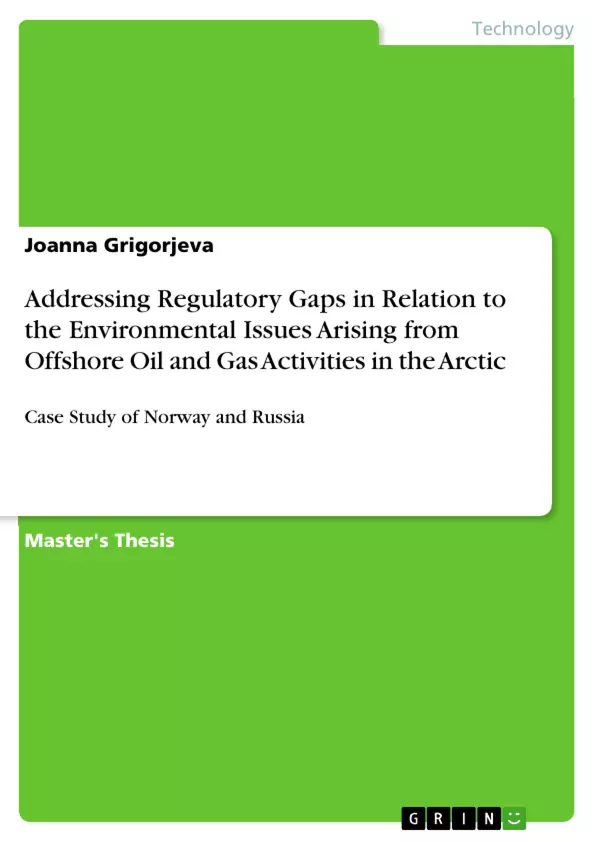
Addressing Regulatory Gaps in Relation to the Environmental Issues Arising from Offshore Oil and Gas Activities in the Arctic
Masterarbeit, 2014
108 Seiten, Note: 2:1
Leseprobe
Inhaltsverzeichnis (Table of Contents)
- Introduction
- The Arctic: A Fragile Ecosystem
- The Arctic Environment
- Climate Change and its Impact on the Arctic
- The Importance of the Arctic
- The Legal Framework for Oil and Gas Activities in the Arctic
- UNCLOS and its Role in the Arctic
- The Arctic Council and its Soft-Law Instruments
- The Ilulissat Declaration
- Environmental Regulation of Oil and Gas Activities in the Arctic
- International Environmental Law
- National Environmental Regulation in the Arctic
- Norway
- Russia
- Addressing Regulatory Gaps in Relation to Environmental Issues Arising from Offshore Oil and Gas Activities in the Arctic
- The Arctic Framework Treaty
- Ecosystem-Based Management in the Arctic
- Implementation of Ecosystem-Based Management on the Russian Continental Shelf
- Conclusion
Zielsetzung und Themenschwerpunkte (Objectives and Key Themes)
This paper examines the environmental regulation of oil and gas activities in the Arctic, focusing on the regulatory gaps that exist in the current legal framework. It aims to analyze the effectiveness of existing international and national regulations in ensuring environmentally safe oil and gas exploration and production in the Arctic. The paper will specifically examine the case studies of Norway and Russia to identify key challenges and propose potential solutions.
- The impact of climate change on the Arctic environment
- The legal framework for oil and gas activities in the Arctic, including UNCLOS, the Arctic Council, and national regulations
- The effectiveness of existing environmental regulations in mitigating the risks associated with oil and gas activities in the Arctic
- The need for a comprehensive Arctic Framework Treaty to address regulatory gaps
- The potential of ecosystem-based management as a tool for sustainable oil and gas development in the Arctic
Zusammenfassung der Kapitel (Chapter Summaries)
The introduction sets the stage for the research by outlining the importance of the Arctic, the environmental challenges it faces, and the growing interest in oil and gas exploration in the region.
The second chapter provides an overview of the Arctic environment, its unique characteristics, and the impact of climate change on the region. It discusses the ecological and economic significance of the Arctic and the need for its protection.
The third chapter examines the legal framework governing oil and gas activities in the Arctic, focusing on the role of UNCLOS, the Arctic Council, and the Ilulissat Declaration. It explores the challenges of balancing economic development with environmental protection in the region.
The fourth chapter analyzes the environmental regulation of oil and gas activities in the Arctic, including both international and national frameworks. It examines the strengths and weaknesses of the existing regulatory regime and highlights key areas for improvement.
The fifth chapter investigates the regulatory gaps that exist in the current legal framework and proposes potential solutions, including the development of an Arctic Framework Treaty and the implementation of ecosystem-based management on the Russian continental shelf.
Schlüsselwörter (Keywords)
Arctic, oil and gas, environmental regulation, UNCLOS, Arctic Council, Ilulissat Declaration, climate change, ecosystem-based management, regulatory gaps, Arctic Framework Treaty, Norway, Russia.
Frequently Asked Questions
Why is oil and gas activity increasing in the Arctic?
Global warming is causing Arctic ice to melt, opening up new petroleum opportunities that Arctic states are pursuing for energy security.
What is the legal basis for Arctic regulation?
The Ilulissat Declaration states that UNCLOS provides the legal framework, supplemented by soft-law instruments from the Arctic Council.
Which countries' regulations are examined in this paper?
The paper specifically analyzes the national petroleum and environmental regulations of Norway and Russia.
What is "Ecosystem-Based Management" (EBM)?
EBM is a management plan suggested to address sub-regional environmental issues; the paper proposes its implementation on the Russian continental shelf.
What solution does the paper propose for regulatory gaps?
The paper suggests addressing existing regulatory gaps through a comprehensive Arctic Framework Treaty.
Details
- Titel
- Addressing Regulatory Gaps in Relation to the Environmental Issues Arising from Offshore Oil and Gas Activities in the Arctic
- Untertitel
- Case Study of Norway and Russia
- Hochschule
- Robert Gordon University Aberdeen
- Veranstaltung
- Oil and Gas Law - Environmental Law
- Note
- 2:1
- Autor
- Joanna Grigorjeva (Autor:in)
- Erscheinungsjahr
- 2014
- Seiten
- 108
- Katalognummer
- V337756
- ISBN (eBook)
- 9783668287464
- ISBN (Buch)
- 9783668287471
- Dateigröße
- 1279 KB
- Sprache
- Englisch
- Schlagworte
- addressing regulatory gaps relation environmental issues arising offshore activities arctic case study norway russia
- Produktsicherheit
- GRIN Publishing GmbH
- Preis (Ebook)
- US$ 39,99
- Preis (Book)
- US$ 51,99
- Arbeit zitieren
- Joanna Grigorjeva (Autor:in), 2014, Addressing Regulatory Gaps in Relation to the Environmental Issues Arising from Offshore Oil and Gas Activities in the Arctic, München, Page::Imprint:: GRINVerlagOHG, https://www.diplomarbeiten24.de/document/337756
- Autor werden
- Ihre Optionen
- Vertriebskanäle
- Premium Services
- Autorenprofil
- Textarten und Formate
- Services für Verlage, Hochschulen, Unternehmen

- © GRIN Publishing GmbH.
- Alle Inhalte urheberrechtlich geschützt. Kopieren und verbreiten untersagt.
- info@grin.com
- AGB
- Open Publishing
Der GRIN Verlag hat sich seit 1998 auf die Veröffentlichung akademischer eBooks und Bücher spezialisiert. Der GRIN Verlag steht damit als erstes Unternehmen für User Generated Quality Content. Die Verlagsseiten GRIN.com, Hausarbeiten.de und Diplomarbeiten24 bieten für Hochschullehrer, Absolventen und Studenten die ideale Plattform, wissenschaftliche Texte wie Hausarbeiten, Referate, Bachelorarbeiten, Masterarbeiten, Diplomarbeiten, Dissertationen und wissenschaftliche Aufsätze einem breiten Publikum zu präsentieren.
Kostenfreie Veröffentlichung: Hausarbeit, Bachelorarbeit, Diplomarbeit, Dissertation, Masterarbeit, Interpretation oder Referat jetzt veröffentlichen!
- GRIN Verlag GmbH
-
- Nymphenburger Str. 86
- 80636
- Munich, Deutschland
- +49 89-550559-0
- +49 89-550559-10
- info@grin.com
-









